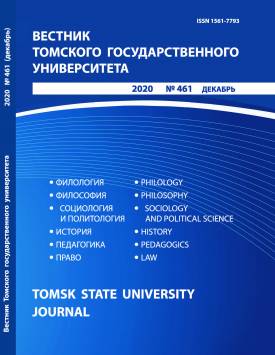Influence of the Type of Bilingualism on Cognitive Processing of Multicomponent Nominative Units (An Experimental Study)
The article presents the final stage of an experimental study of cognitive processing of Russian binomials by native speakers and bilinguals. A hypothesis was put forward about the influence of the type of bilingualism, as well as the factors of frequency and word order in binomials on the process of their cognitive processing. The hypothesis was tested by an E-prime experiment measuring the reaction time. A group of binomials was taken as a stimulus material. They were ranked by frequency, based on subjective assessments of native speakers and data from the Russian National Corpus (high/low frequency), by the irreversibility score, also based on corpus and subjective data (normal/inverted word order). A total of 60 binomials were used. Thirty high-frequency (frequency range from 3.447 to 0.3 ipm) and 30 low-frequency units (frequency range from 0.2 to 0.007 ipm), all of them with the irreversibility score from 75 to 100, i.e. binomials-freezes, units with a fixed word order. Functional bilinguals, students from China studying at Tomsk universities and having a TORFL level 2 certificate were invited as respondents. A total of 25 people took part in the experiment, 17 women and 8 men aged 20 to 38. 1,751 reactions were obtained, of which 1,322 reactions were analyzed. The results of the functional bilinguals group were compared with those of the natural bilinguals group and the group of native speakers. The following conclusions have been made. In all three groups of respondents, the effect of frequency and word order parameters is found. The following interactions have been revealed: the reaction time increases with decreasing frequency and changing the word order from normal to inverted. However, if in the group of native speakers and Turkic-Russian natural early bilinguals the difference in reaction time for binomials under four conditions is statistically significant, for Chinese-Russian functional bilinguals post hoc tests do not reveal such a difference. In the group of Chinese-Russian bilinguals, the frequency factor turns out to be the main factor in the processing of binomials, and the word order factor does not affect the processing speed, unlike in the other two groups of respondents. It is concluded that natural bilinguals process binomials according to the model of native speakers, while the pattern of processing binomials by artificial bilinguals differs from the model of processing in the other two groups. Thus, confirming the hypothesis put forward, the author states that the factor of the type of bilingualism affects the processing of multicomponent nominative units in bilinguals.
Keywords
collocations,
binomials,
cognitive processing,
bilingualism,
experimentAuthors
| Bub Aleksandra S. | Tomsk State University | aleksandrabub@yandex.ru |
Всего: 1
References
Starreveld P., De Groot A., Rossmark B., Van Hell J. Parallel language activation during word processing in bilinguals: Evidence from word pro duction in sentence context // Bilingualism: Language and Cognition. 2014. 17 (2). P. 258-276. DOI: 10.1017/S1366728913000308
Clahsen H., Felser C. How native-like is non-native language processing? // Trends in Cognitive Sciences. 2006. 10 (12). P. 564-570. DOI: 10.1016/j.tics.2006.10.002
Benor S.B., Levy R. The chicken or the egg? A probabilistic analysis of English binomials // Language. 2006. № 82 (2). P. 233-277.
Gustafsson M. Binomial Expressions in Present-Day English. A Syntactic and Semantic Study. Turku : Turun Yliopisto, 1975. 173 p.
Климовская Г.И. Дело о синлексах (к вопросу о функциональном подходе к номинативному материалу языка) // Вестник Томского госу дарственного университета. 2008. № 3 (4). С. 44-54. DOI: 10.17223/15617793/443/5
Фомин Э.В. Парные слова в русском языке // Научный форум: Филология, искусствоведение и культурология: сб. ст. по материалам XIV междунар. науч.-практ. конф. № 3 (14). М. : Изд. «МЦНО», 2018. С. 114-118.
Fenk-Oczlon G. Word frequency and word order in freezes // Linguistics 27. 1989. № 3. P. 517-556.
Arcara G., Lacaita G., Mattaloni E., Passarini L., Mondini S., Beninca P., Semenza C. Is 'hit and run' a single word? The processing of irreversible binomials in neglect dyslexia // Frontiers in Psychology. 2012. Vol. 3, № 11. P. 1-11. DOI: 10.3389/fpsyg.2012.00011
Wolter B., Gyllstad H. Collocational links in the L2 mental lexicon and the influence of L1 intralexical knowledge // Applied Linguistics. 2011. Vol. 34, № 4. P. 430-449. DOI: 10.1093/applin/amr011
Wolter B., Gyllstad H. Frequency of input and L2 collocational processing // Studies in Second Language Acquisition. 2013. Vol. 35, № 03. P. 451-482. DOI: 10.1017/S0272263113000107
Montrul S., Davidson J., De la Fuente I., Foote R. Early language experience facilitates the processing of gender agreement in Spanish heritage speakers // Bilingualism: Language and Cognition. 2014. № 17. P 118-138. DOI: 10.1017/S1366728913000114
Буб А.С. Когнитивная обработка коллокаций-биномиалов русского языка (экспериментальное исследование) // Вестник Томского государственного университета. 2019. № 442. С. 5-13. DOI: 10.17223/15617793/442/1
Буб А.С., Резанова З.И. Степень устойчивости биномиалов русского языка в соотношении с параметрами частности и предсказуемости элементов // Вестник Томского государственного университета. 2018. № 437. С. 15-22. DOI: 10.17223/15617793/437/2
Буб А.С., Артёменко Е.Д. Когнитивная обработка биномиалов русского языка тюркско-русскими билингвами // Язык и культура. 2019. № 48. С. 32-45. DOI: 10.17223/19996195/48/2
Резанова З., Буб А. Коллокации-биномиалы в русской речи: семантические типы, объективная и субъективная частотность // Quaestio Rossica. 2017. Т. 5, № 4. С. 1164-1177. DOI: 10.15826/qr.2017.4.273
Baetens Beardsmore H. Bilingualism: Basic Principles // Multilingual Matters. 1986. P. 205.
Артёменко Е.Д., Буб А.С. Динамика социолингвистической ситуации хакасско-русского языкового взаимодействия на территории Южной Сибири // Русин. 2019. Т. 56. С. 294-311. DOI: 10.17223/18572685/56/18
Резанова З.И., Некрасова Е.Д., Миклашевский А.А. Исследование психолингвистических и когнитивных аспектов языкового контактирования в проекте «Языковое и этнокультурное разнообразие Южной Сибири в синхронии и диахронии: взаимодействие языков и культур» // Русин. 2018. № 2 (52). С. 107-117. DOI: 10.17223/18572685/52/8
Резанова З.И., Темникова И.Г., Некрасова Е.Д. Динамика социолингвистических процессов в Южной Сибири в зеркале билингвизма (русско-шорское и русско-татарское языковое взаимодействие) // Вестник Томского государственного университета. 2018. № 436. С. 56-68. DOI: 10.17223/15617793/436/7
Baker C. Foundations of bilingual education and bilingualism. Multilingual Matters Ltd., 1993. 492 p.

